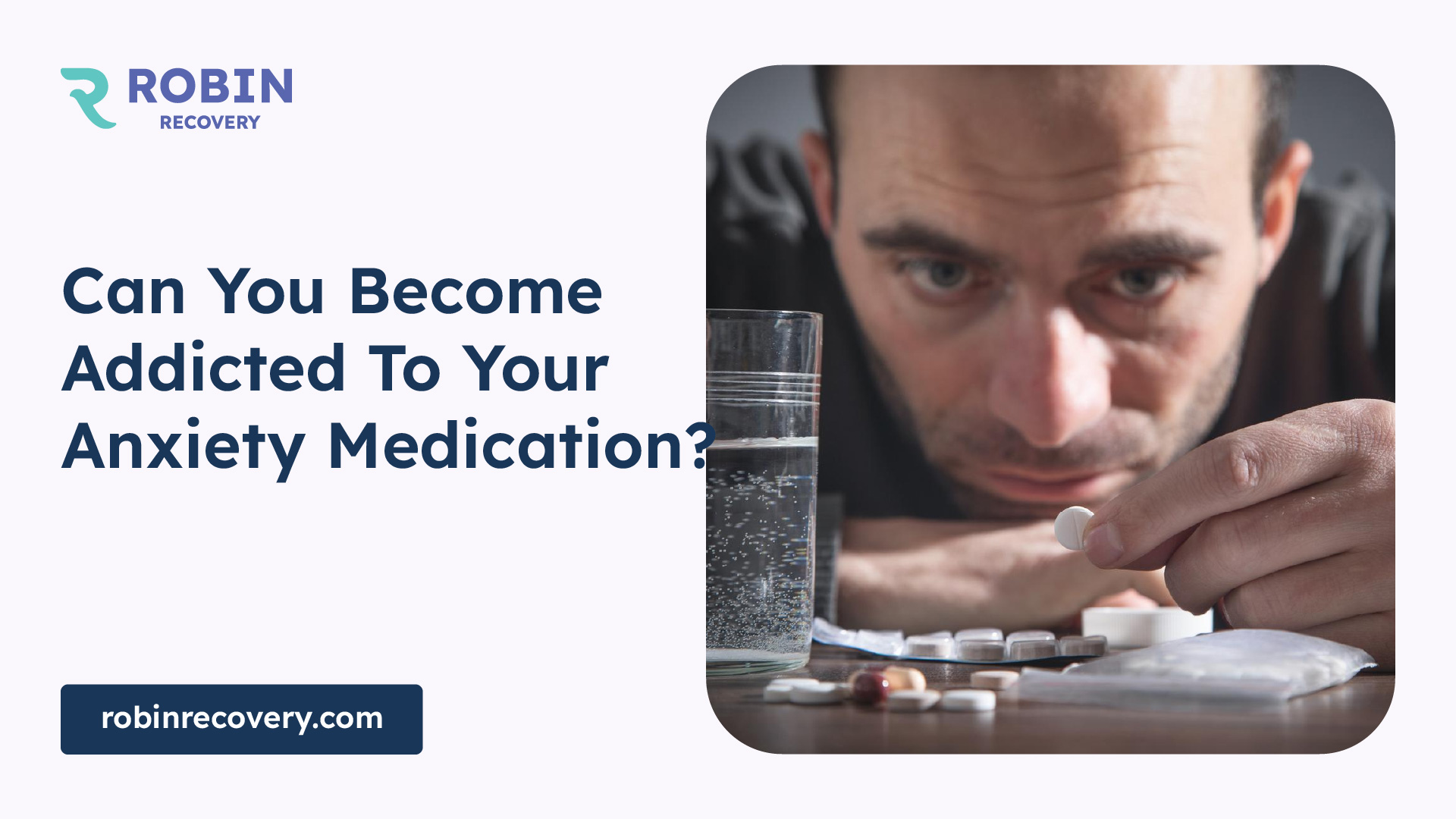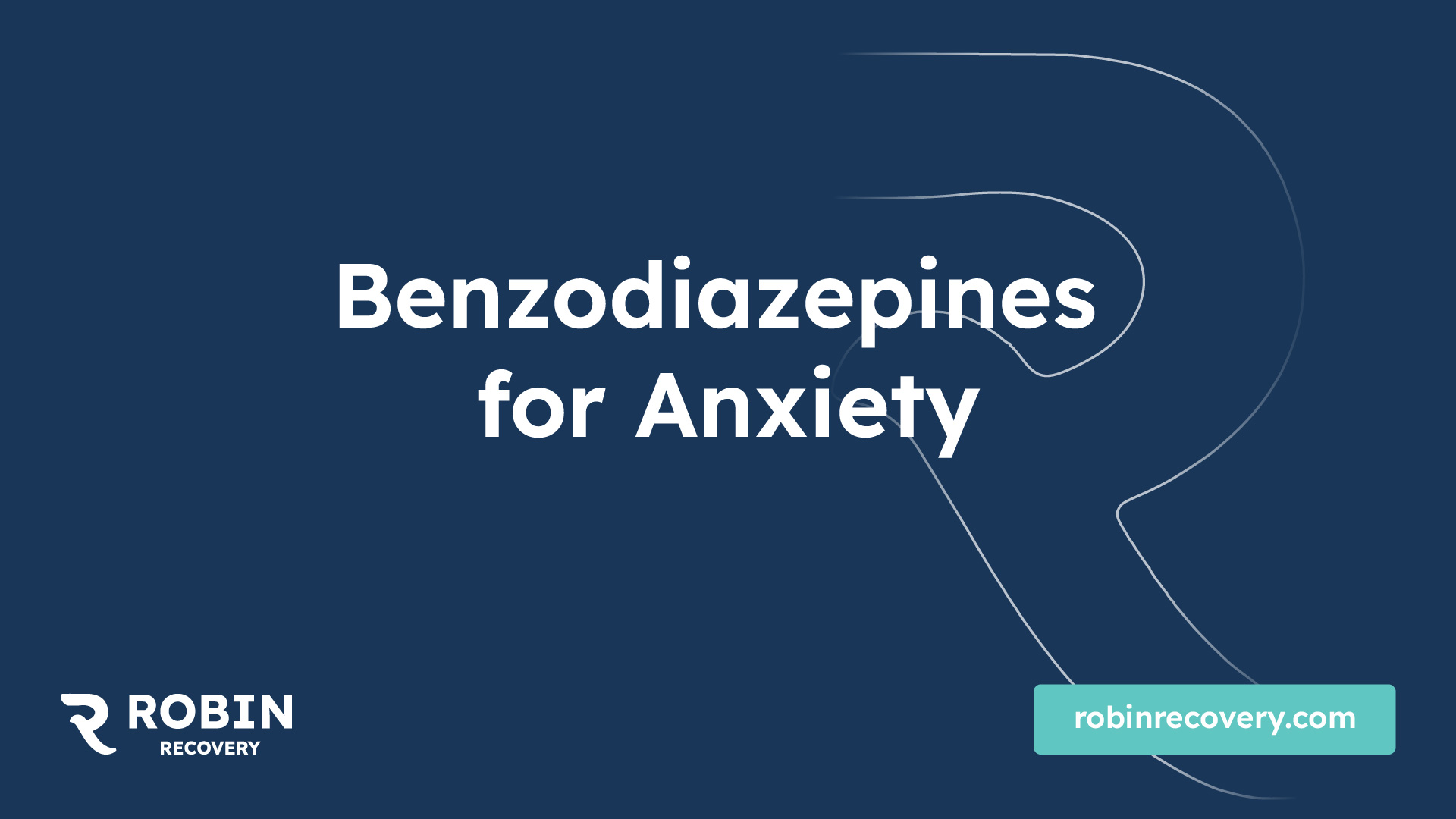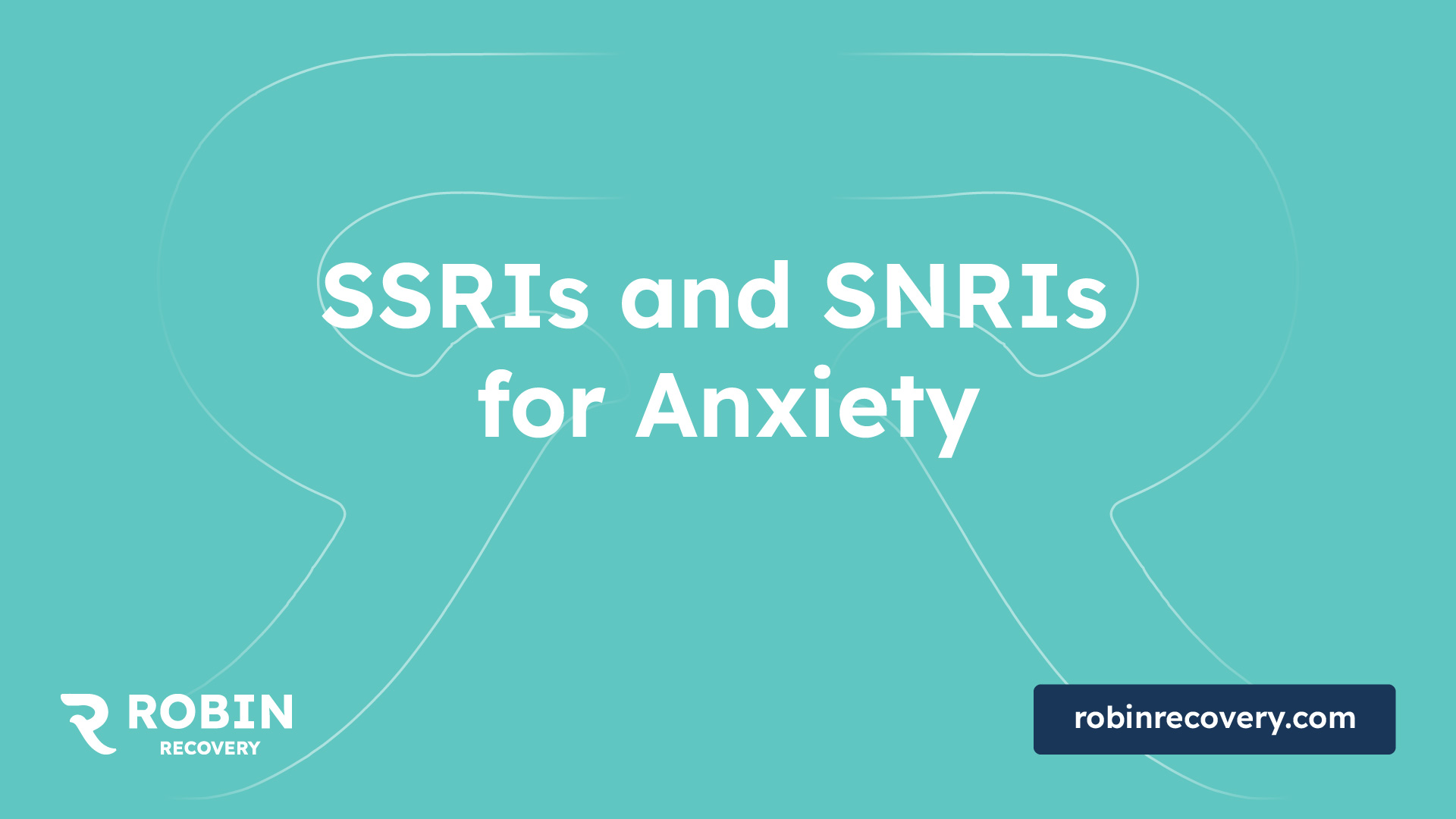Can You Become Addicted To Your Anxiety Medication?

Understanding Anxiety Medication

Types of Anxiety Medications
Various medications can alleviate the symptoms of anxiety disorders, which are commonly referred to as anxiolytics. Choosing the right type of medication depends on the specific anxiety condition, symptoms, and any additional health factors the individual may have. Some anxiety medications have the potential to be habit-forming, thus they are usually prescribed for short-term use or as needed.
Common types of anxiety medications include:
Medication TypeExamplesKey FeaturesBenzodiazepinesDiazepam, LorazepamQuick-relief; potential for dependenceSelective Serotonin Reuptake Inhibitors (SSRIs)Sertraline, FluoxetineFirst-line treatment; generally non-habit formingSerotonin-Norepinephrine Reuptake Inhibitors (SNRIs)Venlafaxine, DuloxetineEffective for anxiety and chronic pain; non-habit formingTricyclic Antidepressants (TCAs)Amitriptyline, ClomipramineOlder class; used less frequently now
Effectiveness of Anxiety Medications
Selective Serotonin Reuptake Inhibitors (SSRIs) are widely recognized as the first-line treatment for Generalized Anxiety Disorder (GAD). SSRIs function by preventing nerve cells in the brain from reabsorbing serotonin, a neurotransmitter critical for mood stabilization. Research shows that SSRIs typically do not induce dependence or addiction, which addresses the question, can you become addicted to your anxiety medication?
Patients commonly use SSRIs for a duration of 6 to 12 months. After this period, they usually start tapering their dosage under the guidance of their healthcare provider [2].
Serotonin-Norepinephrine Reuptake Inhibitors (SNRIs) are also considered first-line treatments for anxiety. They work by decreasing the reabsorption of both serotonin and norepinephrine in the brain. SNRIs can also be prescribed for chronic pain conditions but are less effective for Obsessive-Compulsive Disorder (OCD) compared to SSRIs [2].
Understanding the different types of anxiety medications and their effectiveness is crucial for individuals seeking relief from anxiety symptoms. For those who may feel overwhelmed by their condition, resources on self-medicating an anxiety disorder or identifying common social anxiety disorder symptoms may prove valuable.
Benzodiazepines for Anxiety
Benzodiazepines are a class of medications often prescribed to treat severe anxiety and panic attacks. They work by enhancing the effects of a neurotransmitter called gamma-aminobutyric acid (GABA), which has a calming effect on the brain and helps reduce feelings of anxiety.

Function of Benzodiazepines
Benzodiazepines, such as Xanax, Klonopin, Ativan, Valium, and Rohypnol, are considered effective for treating anxiety. These medications can provide rapid relief from anxiety symptoms, making them useful for individuals experiencing acute anxiety or panic attacks. However, it's essential to use benzodiazepines under medical supervision to avoid potential dependency issues [3].
MedicationCommon UsesXanaxPanic disorderKlonopinGeneralized anxietyAtivanAnxiety and insomniaValiumAnxiety and muscle spasmRohypnolSevere insomnia
Risks and Side Effects
While benzodiazepines can be effective, they come with several risks and potential side effects. Long-term use can lead to physical addiction and painful withdrawal symptoms, complicating any efforts to stop taking them.
Abruptly discontinuing medications such as Xanax or Klonopin can cause withdrawal symptoms like increased anxiety, depression, confusion, restlessness, insomnia, sweating, heart palpitations, and shaking. These withdrawal symptoms can be quite severe and uncomfortable, making it difficult for individuals to wean themselves off benzodiazepines.
Attempting to detox from benzodiazepines at home can be dangerous. To safely discontinue these medications, it is crucial to do so under medical supervision, often in a monitored detox program that emphasizes holistic therapy options. For more information on anxiety and the potential for addiction, consider reading about anxiety and addiction.
Understanding the function and risks of benzodiazepines is essential for anyone considering these medications for anxiety treatment. It is always advisable to consult with a healthcare professional to discuss personal circumstances and treatment options.
SSRIs and SNRIs for Anxiety
Anxiety disorders can significantly impact an individual's daily life, which is why effective treatment options are essential. Among these options, Selective Serotonin Reuptake Inhibitors (SSRIs) and Serotonin-Norepinephrine Reuptake Inhibitors (SNRIs) have emerged as popular choices for managing anxiety.

Role of SSRIs in Anxiety Treatment
SSRIs are considered the first-line treatment for general anxiety disorder (GAD). They work by preventing nerve cells in the brain from reabsorbing serotonin, a neurotransmitter crucial for mood regulation. This increase in serotonin levels helps reduce anxiety symptoms. SSRIs typically start to show effects within 2–6 weeks and are often prescribed for a duration of 6–12 months. Patients gradually reduce the dosage once the anxiety symptoms are under control.
One significant advantage of SSRIs is that they are not habit-forming, which means they do not typically lead to dependency, addressing concerns regarding the question: can you become addicted to your anxiety medication? This characteristic makes SSRIs a safer long-term option for many individuals managing anxiety.
Key Features of SSRIsDescriptionMechanism of ActionInhibit serotonin reabsorptionOnset of Action2-6 weeksDuration of Treatment6-12 months, followed by gradual dosage reductionDependency RiskLow, generally not habit-forming
SNRIs as Anxiety Medications
SNRIs are another effective option for treating anxiety disorders. These medications function similarly to SSRIs but also inhibit the reabsorption of norepinephrine, another neurotransmitter involved in mood regulation. By increasing both serotonin and norepinephrine levels in the brain, SNRIs can help alleviate anxiety symptoms and improve overall mental well-being.
While SNRIs can be effective for various anxiety conditions, their potential side effects differ from those of SSRIs. Like SSRIs, SNRIs are generally non-habit-forming, which alleviates concerns regarding dependency.
Key Features of SNRIsDescriptionMechanism of ActionInhibit reabsorption of serotonin and norepinephrineCommonly Prescribed ForGeneralized Anxiety Disorder and other anxiety issuesDependency RiskLow, generally not habit-forming
Both SSRIs and SNRIs are widely prescribed and have been found to be effective in managing anxiety symptoms [4]. Patients seeking relief from anxiety can discuss these treatment options with their healthcare providers, ensuring a personalized approach to managing their symptoms. For those considering additional methods, exploring the relationship between anxiety and addiction may provide valuable insights into their treatment journey.
TCA and Other Options
Tricyclic Antidepressants Overview
Tricyclic Antidepressants (TCAs) are sometimes used in the treatment of anxiety, particularly when other medications, such as SSRIs or SNRIs, prove ineffective. TCAs work by blocking the reabsorption of neurotransmitters such as serotonin and norepinephrine, thereby increasing their levels in the brain.
While TCAs can be effective in managing anxiety and depression, their use is often limited due to the potential for adverse side effects compared to other options. This makes doctors more likely to prescribe SSRIs and SNRIs as first-line treatments for anxiety disorders.
TCA NameCommon UseKey MechanismAmitriptylineDepression & AnxietyBlocks reabsorption of serotonin and norepinephrineNortriptylineDepression & AnxietySimilar mechanism as amitriptylineClomipramineOCD & AnxietyWorks on serotonin receptors to manage symptoms
Alternative Medication Choices
In addition to TCAs, there are other alternatives available for the treatment of anxiety. If patients experience limited relief from first-line medications, they may consider the following options:
The choice of medication should always be guided by a healthcare professional, who can assess individual needs and recommend the most appropriate treatment. Understanding these alternative options is crucial for those asking, “can you become addicted to your anxiety medication?” as they provide pathways to effective management of anxiety symptoms without the risks associated with certain medications.
Addiction Potential of Anxiety Medications
Anxiety medications can be effective in managing anxiety symptoms, but there is a legitimate concern about the potential for addiction, particularly with some types of medications like benzodiazepines. Understanding the risks and dependencies associated with these medications is essential for anyone considering or currently using them.
Benzodiazepines and Addiction Risk
Benzodiazepines are commonly prescribed for anxiety relief. However, long-term use of these medications can lead to physical addiction and withdrawal symptoms when discontinuing their use. This addiction risk is significant, as the withdrawal process can be painful and uncomfortable, making it difficult for individuals to stop taking them without support [3].
The table below illustrates the common benzodiazepines and their potential addiction risks:
BenzodiazepineCommon UseAddiction RiskAlprazolamGeneralized Anxiety DisorderHighDiazepamAnxiety, muscle spasmsModerateLorazepamAnxiety, insomniaHighClonazepamPanic disorderHigh
Benzodiazepines can create a sense of relaxation and euphoria, leading to potential misuse. As individuals may increase their dosage to achieve the same effects over time, the likelihood of developing dependence escalates.
Dependency on Anxiety Medications
Dependency on anxiety medications can occur even with medications not considered addictive, such as Selective Serotonin Reuptake Inhibitors (SSRIs). Although SSRIs typically do not lead to physical dependence, patients may find it challenging to stop treatment due to the return of anxiety symptoms. Studies indicate that patients often take SSRIs for a period ranging from 6 to 12 months before gradually reducing the dosage.
Additionally, some individuals experience a phenomenon known as "poop-out," where antidepressants lose their effectiveness over time [5]. This may lead them to believe they need to continuously rely on medications to manage their anxiety, contributing to feelings of dependency.
Seeking help from healthcare providers can help manage this dependency, as they can offer personalized treatment plans tailored to the individual's needs. Understanding the signs of dependency, such as an increased need for medication or experiencing withdrawal symptoms, is essential for maintaining both physical and mental health.
For more information on anxiety and addiction, visit our section on anxiety and addiction.
Seeking Professional Guidance
Importance of Medical Consultation
Consulting a healthcare professional is a crucial step for individuals considering anxiety medication. An accurate evaluation by a qualified healthcare provider ensures the appropriate prescription of anti-anxiety medications. A thorough assessment typically considers medical history, current medications, mental health status, and specific treatment goals. This meticulous process is essential since receiving the wrong medication could worsen anxiety symptoms [6].
Initial consultations may focus on psychological treatments, such as cognitive behavioral therapy (CBT), which is often advised before medication is prescribed NHS. Medication choices will also be discussed in detail to clarify the benefits and potential risks associated with different options. Regular follow-up appointments are generally scheduled to monitor progress, especially during the first few months of treatment. These appointments typically occur every 2-4 weeks initially and then shift to every 3 months [7].
Personalized Treatment Approaches
In managing anxiety effectively, personalized treatment plans play an essential role. A tailored approach to treatment considers an individual’s specific anxiety symptoms and medical history, which aids in achieving relief and improving overall well-being [4].
SSRIs (Selective Serotonin Reuptake Inhibitors) are often the first-line medication for generalized anxiety disorder. These medications typically do not lead to dependence and provide a safer alternative for long-term management. In therapy sessions, healthcare providers often collaborate with patients to adjust treatment as necessary based on efficacy and any side effects that may arise.
This cohesive strategy not only helps to manage anxiety symptoms but also reduces the risk of developing dependency. For those seeking to understand more about the potential addiction to anxiety medications, querying "can you become addicted to your anxiety medication?" can provide additional insight into this complex topic.
By emphasizing professional guidance and tailored approaches, individuals can navigate their anxiety treatment more effectively while minimizing risks related to medication use. Want to learn about self medication issues? Explore our article on self-medicating an anxiety disorder.
References
[2]:
[3]:
[4]:
[5]:
[6]:
[7]:
